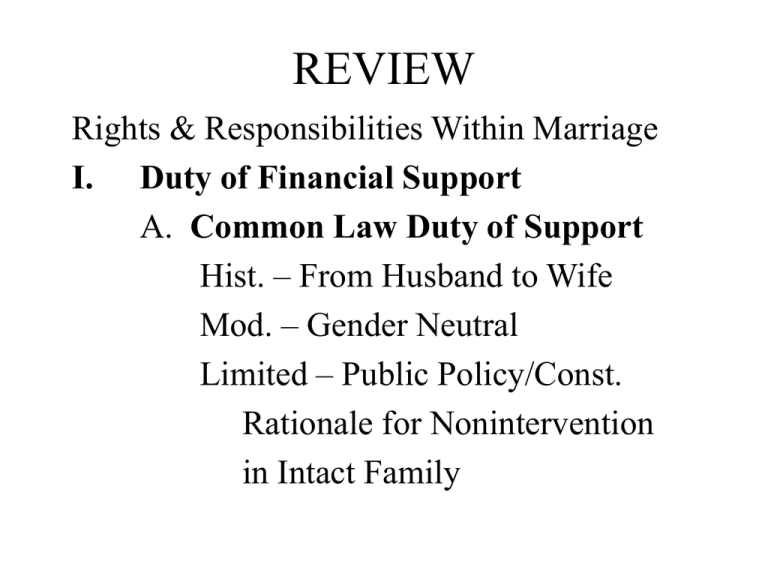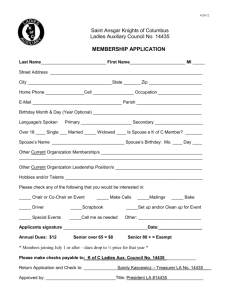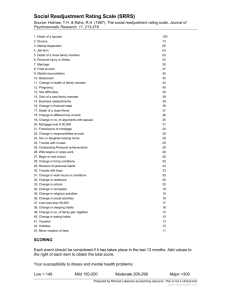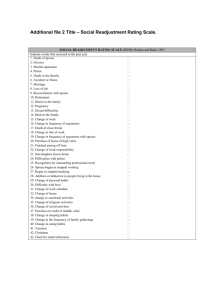
REVIEW
Rights & Responsibilities Within Marriage
I. Duty of Financial Support
A. Common Law Duty of Support
Hist. – From Husband to Wife
Mod. – Gender Neutral
Limited – Public Policy/Const.
Rationale for Nonintervention
in Intact Family
B. Doctrine of Necessaries
- Gives 3rd parties C/A agnst spouse
for food, clothing, shelter, med.expenses
- Not in effect in every state
- Prior to 1970’s – obligation ran only
to husband for wife’s debts
- Beginning in 1970’s – genderbased challenges; states either abolished
or made gender-neutral; MD 1981-abolished
II.
Duty to Refrain from Abuse
FAMILY VIOLENCE:
Obligation to Refrain from Abusing
(Physical/Sexual/Threats) Members
of Family (Spouses, Intimate
Partners, and Children)
FREQUENCY: Each year in
America, more women abused by
husbands than get married
• 4 million women beaten by intimate partner
~married, dating, cohabitating women,
divorcing or separating women
• Women 6 times more likely to be beaten
by husband than by stranger
• 3 out of 4 women killed in U.S., murdered
by current or former husbands or boyfriends
Historically: Right of Privacy and
Family Autonomy/ Justified NonIntervention
(“Rule of Thumb”)
Change: Beginning in
1960’s, women’s
movement in U.S. and
internationally increased
public and legal
awareness
Protections
CRIMINAL:
State
• Misdemeanors & Felonies
• Marital Rape
• Mandatory Arrest
• Pro Prosecution Policies
• Domestic Violence Courts
• Battered Women Syndrome
(Self Defense or Reduction
of Charges)
Federal
• Violence Against Women Act (VAWA)
PROTECTIONS – cont’d
CIVIL:
• Civil Protection Orders: Emergency Orders
Available in Every State
• Divorce: Abuse Ground
• Child Custody/Visitation: Abuse of Mother
or Children Factor
MARITAL RAPE
Arguments Against Prosecution
1) Doctrine of Implied Consent
2) Preserve Family/Marital Privacy –
promote harmony within marriage
3) Difficulty of Proof/Fabricated
Complaints
Arguments in Favor of Prosecution
1) Implied consent based on long rejected
theories of property and unity of marriage
2) Right of Privacy only protects consensual
acts/not applicable where one spouse harmed
3) Difficulty of Proof – same in marital and
stranger rapes
Current State of Law
1) 24 states have abolished any form of
exemption
2) 13 states give some exemption
3) Balance - silent
Maryland – until 1976 – complete marital rape
exemption unless legal separation
1989: narrower exemption
Marital Rape Exemption Unless:
1) Living separate and apart pursuant to a decree of
limited divorce, or
2) Live separate and apart pursuant to a separation
agreement or for at least six months, or
3) If force is used in commission of offense
Evidentiary Consequences of Marriage
Spousal Disqualification/Privilege Rationale?
1) Civil vs. criminal cases
2) Pro-spouse vs. adverse spouse testimony
3) Privilege vested in spouse/defendant vs. spouse
witness
Federal Rule:
Criminal cases
Witness only
Adverse testimony
Maryland Rule:
1) Broad prohibition on confidential
communications
2) Criminal cases: witness has privilege
unless
a) Child abuse
b) Domestic violence and invoked
privilege once before
§ 10-916. Battered Spouse Syndrome
(a) Definitions. –
(2) “Battered Spouse Syndrome” means the
psychological condition of a victim of repeated
physical abuse by a spouse, former spouse, cohabitant,
or former cohabitant which is also recognized in the
medical and scientific community as the “Battered
Woman’s Syndrome.”
(3) “Defendant” means an individual charged with:
(i) First degree murder, second degree murder
manslaughter, or attempt to commit any of
these crimes; or
(ii) Assault in the first degree.
(b) Admissibility of evidence – Notwithstanding
evidence that the defendant was the first aggressor, used
excessive force, or failed to retreat at the time of the
alleged offense, when the defendant raises the issue that
the defendant was, at the time of the alleged offense,
suffering from the Battered Spouse Syndrome as a result
of the past course of conduct of the individual who is the
victim of the crime for which the defendant has been
charged, the court may admit for the purpose of
explaining the defendant’s motive or state of mind, or
both, at the time of the commission of the alleged
offense:
(1) Evidence of repeated physical and psychological
abuse of the defendant perpetrated by an individual who
is the victim of a crime for which the defendant has been
charged; and
(2) Expert testimony on the Battered Spouse Syndrome.







